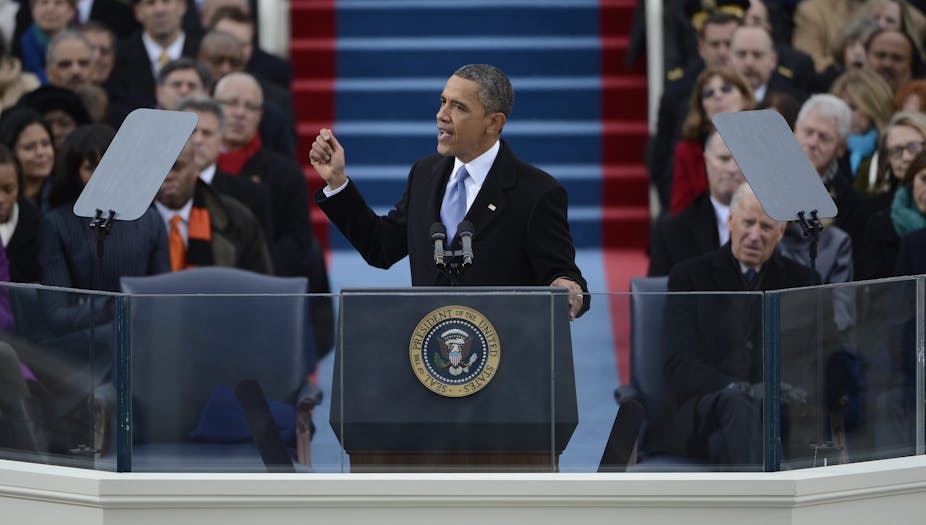Much has been made of the fact President Obama became the first president to mention the word gay in an inaugural address.
But the significance lies not in what he said but how he said it.
In declaring, “Our journey is not complete until our gay brothers and sisters are treated like anyone else under the law” Obama not only declared himself abstractly for “gay rights”, he placed these rights at the heart of the central ideals of the American story.
Obama’s whole speech sprung from his reiteration of the much sung hymn to equality from the Declaration of Independence which he quoted at the start of his speech:
We hold these truths to be self-evident, that all men are created equal, that they are endowed by their Creator with certain unalienable rights, that among these are Life, Liberty, and the pursuit of Happiness
Presidents and other American orators are fond of quoting this lodestone of the American dream, so it is not surprise that Obama should refer to it.
But his speech was much more telling because he made clear that he took those words as a call to action:
For history tells us that while these truths maybe self-evident, they have never been self-executing; that while freedom is a gift from God, it must be secured by His people here on Earth.
Again, a rousing call to act for freedom and equality is common place in the American presidential tradition. Obama’s distinctive play on this came with his declaration that securing equality and freedom entailed both a steadfast commitment to the founding father’s vision and embracing intelligent changes in the light of contemporary challenges.
But we have always understood that when times change, so must we; that fidelity to our founding principles requires new responses to new challenges; that preserving our individual freedoms ultimately requires collective action
Obama’s riff on gay and lesbian rights then begins in a very specific way which very skillfully links it to both adaptation to new challenges and collective action.
We, the people, declare today that the most evident of truths – that all of us are created equal – is the star that guides us still; just as it guided our forebears through Seneca Falls, and Selma, and Stonewall; just as it guided all those men and women, sung and unsung, who left footprints along this great Mall, to hear a preacher say that we cannot walk alone; to hear a King proclaim that our individual freedom is inextricably bound to the freedom of every soul on Earth.
In this extraordinary declaration, Obama not only declares that adapting to, and fighting for, gay and lesbian rights is important, but that the fight for these rights, which stems from the 1969 Stonewall riots, should be placed on the same footing as the fight for women’s rights at Seneca Falls and the fight for racial equality at Selma. Here the president effectively placed the fight for gay and lesbian rights within the myth of the ongoing American revolution.
This leads to an explicit call for gay and lesbian equality in the next paragraph:
Our journey is not complete until our gay brothers and sisters are treated like anyone else under the law – for if we are truly created equal, then surely the love we commit to one another must be equal as well.
Obama goes further here than any of his predecessors would have dared. This is not just a call for equality under the law, it is a carefully phrased call for same sex marriage: “the love we commit to one another must be equal as well”.
Obama has recently declared his support for same sex marriage, so this is not a new statement. But his inclusion of such a statement in an inaugural address, a key ritual moment of American democracy, and his inclusion of this declaration in the context of the fight for women’s and civil rights marks yet another milestone in the story of gay and lesbian citizenship.
The fight for marriage equality faces several key tests in the US this year, the most significant of which are the cases before the Supreme Court about the constitutionality of the Defense of Marriage Act and California’s Proposition 8, both of which define marriage as exclusively between a man and a woman.
One of the ongoing pressure points in American public debate has been around so called “judicial-activism” on social issues. In opposing such “activism” conservative legal scholars often adhere to a doctrine called “originalism”, which proclaims that any constitutional judgement must aim to get as close as possible to the original meaning of the words of the founding fathers when interpreting the constitution.
In this carefully crafted speech, Obama not only laid a claim for gay and lesbian equality and same sex marriage; he was laying a claim that any constitutional value of equality does not have an original or fundamentalist meaning, rather one that constantly evolves.
This is fundamentally at odds with our own Prime Minister Julia Gillard, who appeals to the importance of tradition and “heritage” in her own refusal to acknowledge the marriage rights of gay and lesbian Australians.
Traditions only continue to have meaning when they are reinterpreted and made relevant by each generation. Obama’s inauguration speech was an inspiring attempt to do this. Let’s hope his actions over the next four years are equally inspiring.

